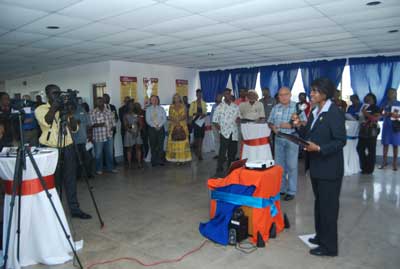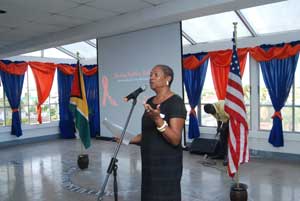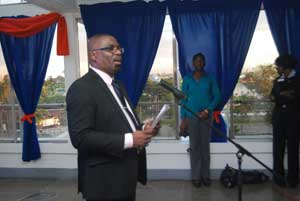By Shirley Thomas
THE United States Agency for International Development (USAID)-supported ‘Advancing Partners and Communities’ (APC) Project, in collaboration with Guyana Business Coalition against HIV and AIDS (GBCHA), on Thursday, launched a campaign to expand and strengthen collaboration between Guyana’s business sector and non-governmental organisations (NGOs) responding to the threat of HIV/AIDS.
The initiative was hosted at the DDL High Street, Kingston Georgetown building, previously occupied by GHARP I and II and subsequently by APC under the theme ‘Working Together…Achieving Zero: Zero New Infections; Zero AIDS-Related Deaths; Zero Stigma.’
Ms. Tracy Lewis, GBCHA Chairperson addresses the gathering.
The Joint APC-GBCHA drive is being undertaken with the aim of expanding and reinforcing partnerships involving businesses and NGOs, as the new alliance seeks to reduce the stigma and discrimination associated with HIV/AIDS and to prevent new infections.
Meanwhile, initiated concurrently was the GBCHA’s signature event, the ‘Annual Awards for Business Excellence.’
Addressing that forum, Executive Director of GBCHA, Ms. Tracy Lewis said the occasion was an unparalled opportunity to publicly recognise the unique and vital contributions made towards health and wellness by the Business Sector.
She added that, this year, the GBCHA has modified the award categories to acknowledge and support this work.
Coincidentally, the GBCHA, yesterday, celebrated its sixth anniversary. Buoyed at the success of the GBCHA-led action over the years, Lewis remarked that Guyana’s Private Sector response serves as a model for partnerships aimed at reducing the spread of HIV and the associated stigma and discrimination.
She thanked all stakeholders for their continued support, as the coalition endeavours to sustain the gains realised so far, to zero out new infections; HIV-related deaths and stigma and discrimination.
ACP Chief of Party, Ms. Folami Harris addresses the gathering at the launch of ‘Working Together…Achieving Zero’
“We have had much success and much work remains,” she acknowledged.
DISTINGUISHED GATHERING
Among the distinguished gathering were Ms. Falomi Harris, Chief of Party, Advancing Partners & Communities (Guyana); Dr. Oleksander Chericas, USAID Health Team Leader; Director of PANCAP Coordinating Unit, Mr. Derrick Springer; Dr. Shanti Singh, NAPS Programme Manager; Suzanne French, Executive Director, GBCHA; Edris George USAID and other development partners from across the UNAIDS spectrum.
Not least were those on the front lines, Ms. Folami Harris aptly alluded to as the ‘Guests of Honour’ on that occasion.
She said: “Our Guests of Honour today are those men and women from businesses across Guyana whose awareness of the national need, whose relationship with the
Director of PANCAP, Mr. Derrick Springer delivers the feature address at the ACP-GBCHA launch at DDL Building on Friday (Cullen Bess-Nelson photos)
Guyanese people and whose commitment to Guyana and Guyana’s development brought them here [today].
She said there were some 44 representatives from small and large businesses wanting to find out more about how they can build a stronger, healthier and more productive Guyana.
IMPRESSIVE DECLINE
Harris was heartened at the achievements of the National HIV response, noting, for example, an impressive decline in the rate of new HIV infections at the end of 2013, under Guyana’s Prevention and Treatment Programme.
For the year under review, there were 758 recorded new infections, as compared to 1,258 in 2006. There has also been a marked reduction in the number of AIDS-related deaths.
Against this backdrop, the ACP Chief of Party, reflecting on what has so far been achieved in the bid to ‘Achieving Zero’ alluded to a scenario (in the wider community and quite outside of this setting) where much work had been put into achieving an end but, woefully, the failure of one link in the chain (the concluding factor) to play its part, resulted in the exercise being reduced to nought and returning to its original state.
Giving kudos to the stakeholders for what has been achieved in the national response and commenting on the negligible distance remaining before reaching the finishing line, she cautioned: “Let this not be the fate of the epidemic, my friends. We are so close to the finish line. We, all of us are the anchors, only together can we finish this race to zero new infections,” she cautioned.
Meanwhile, Director of the Coordinating Unit, Mr. Derrick Springer brought greetings on behalf of the Chair of PANCAP, Prime Minister Denzil Douglas of St. Kitts and Nevis and Secretary General of CARICOM, Ambassador Irwin La Roque.
Springer said: “Given the complexity of HIV and its widespread impact, diverse resources, skills and partnerships are needed for us to achieve a truly multi-sectoral response, shared responsibility and solidarity.”
He observed that strong partnership is critical to implementing health and wellness programmes, particularly those that are designed to target vulnerable populations.
“Partnership is about trust and respect. I would like to underscore that building successful partnerships between the business sector and NGOs require investment of time and an understanding that partnerships are equal,” he affirmed.
The PANCAP Director noted that there have been several good examples of Business-NGO partnership here in Guyana, which have provided lessons that can guide this initiative.
“Although businesses have not been rigid in setting reporting requirements, the NGOs have benefitted from capacity building on good governance for sustainability and must, therefore, be proactive in reporting their business partner,” he stated.
Alluding to the Nassau Declaration (2001) which states: ‘The Health of the Region is the Wealth of the Region’, Mr. Springer said it underscored the importance of health to development.
CRITICAL TO SUCCESS
“I believe that businesses understand that a healthy workforce and environment are critical to success when faced with global health challenges like HIV and AIDS.”
To this end, the PANCAP Director said failure to respond appropriately would result in business development being crippled, industries losing competitive markets and economies crumbling under the heavy weight of HIV and AIDS.
He said, in the context of the HIV response, there has been much discussion regarding political will but contended that technical leadership serves as a catalyst for building will in the business sector, increased collaboration and sustainability.
It was also Springer’s contention that “the architects of this initiative must be commended for demonstrating the technical leadership required for building/strengthening a closer working relationship between two very important sectors as Guyana seeks to encourage shared responsibility in the context of country ownership.”
He added that the business sector needs to preserve human resources that are needed to meet delivery needs and to achieve production and productivity and called on NGOs to seize the opportunity to learn from businesses by engaging them as active participants in the response, particularly leveraging their comparative advantage in influencing behaviour.
“I am confident that Business and NGOs can work together to achieve Zero New Infections; Zero AIDS-deaths and Zero Discrimination. The time to act is now!” the PANCAP Director maintained.


















